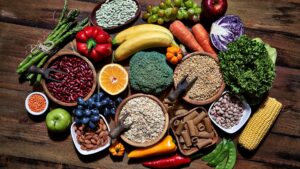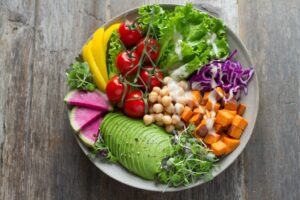Eating a nutritious and balanced diet ensures your body has access to all of the necessary vitamins, minerals, and proteins it requires for proper functioning. Without enough healthy foods in your diet, poor growth and development, infections, and fatigue may arise, while excessive indulgence in unhealthy choices can increase weight gain, diabetes or heart disease risks. A balanced diet should consist of proteins, carbohydrates, fats or lipids, micronutrients (vitamins and minerals) and water.
Protein
Protein helps strengthen muscles, cells and tissues as well as support metabolism and immunity in our bodies. High-quality sources include fish, poultry, dairy products, eggs and legumes such as beans and peas; according to MyPlate guidelines from the U.S. Department of Agriculture, this should make up 50% of your plate, while 25% should contain grains and 25% protein.
Protein is composed of amino acids, some of which the body can synthesise on its own while others must be taken orally. Animal-based food sources (like meats, chicken and milk) provide complete proteins which include all essential amino acids, while plant sources like beans, nuts, legumes and some grains contain incomplete forms that must be eaten together to provide all essential amino acids.
A well-balanced diet can help protect against anaemias and reduce your risk of cardiovascular disease, diabetes and certain cancers. It is also important to avoid empty calories and unhealthy fats while drinking plenty of water each day.
Carbohydrates
Carbohydrates are essential fuel for cell respiration and should be consumed through foods like bread, beans, pasta, rice and fruit, not forgetting sugary beverages!
Glucose is an easily digested simple carbohydrate and the primary energy source in our bodies. When consumed, glucose is digested and absorbed into the bloodstream, where it’s converted to ATP for energy use by cells throughout our bodies. Excess glucose may be stored as glycogen for later use by livers or muscles as needed.
Complex carbohydrates, composed of many monosaccharides linked together, provide another essential source of energy for our bodies. Examples include plant starches and dietary fibre. Complex carbohydrates digest more slowly and provide our bodies with a steady source of glucose; for optimal performance, they should come from unprocessed or minimally processed whole foods like vegetables, fruits and beans.
Fats
Many people perceive fats as harmful, yet they’re necessary for good health. Like carbohydrates and proteins, dietary fats are considered macronutrients. Fats provide the highest caloric density source, as they serve to store energy through the formation of lipid molecules that store energy for later use.
Monounsaturated and polyunsaturated fats are two categories of fats, each providing different health benefits. Monounsaturated fats reduce disease risk and can be found in avocados, peanut butter, plant oils (like olive, canola and safflower oil) and nuts; polyunsaturated fats can also be discovered in food sources like walnuts and flax seeds as well as cold-water fish such as salmon and herring.
In 2011, the USDA retired their food pyramid and now suggests following MyPlate guidelines as a healthy eating strategy. Although balancing your diet may seem challenging, following MyPlate will give you a good foundation for eating healthfully.
Vitamins
A healthy diet offers essential vitamins and minerals for proper growth and development, immune system support and energy level maintenance. Eating well also decreases your risk of diseases like heart disease and type 2 diabetes as well as lowering blood pressure and improving mental wellbeing.
Eating all food groups is crucial, but fruits and vegetables must make up at least one-third of your meals for optimal health. Protein and carbs should also be eaten regularly along with enough fats and minerals.
Most vitamins cannot be stored by our bodies, making a balanced diet all-inclusive essential. A completely balanced diet should consist of fruits, vegetables, dairy products, grains and proteins to ensure we consume an array of essential vitamins.
Minerals
Minerals are essential building blocks of bones, teeth and tissues; they play an integral part in metabolic processes and play an integral role in health. Essential minerals include calcium, sodium and potassium as well as trace minerals such as copper and iodine, which are found in food in small amounts but are essential to proper body functioning.
A balanced diet contains sufficient quantities of vitamins, minerals and other essential nutrients that can reduce chronic health conditions while increasing energy levels.
Attaining optimal levels of certain micronutrients can support optimal functioning of the immune system and manage systemic inflammation. This article details their immunological role and recommended intake, such as magnesium, zinc, selenium, iodine, iron and copper.
Water
Water is essential to a balanced diet. While we can survive several weeks without food, days without water is all it will take for our bodies to shut down and shut down again. While our needs for fluid depend on age, gender and activity levels, an ideal goal would be to consume 2 litres (8 cups).
Fruit juice, decaffeinated tea, milk and other nonalcoholic beverages should all count towards meeting fluid intake goals; however, water should still be your go-to beverage because excessive sugar in drinks could have serious repercussions for health.
If you are concerned about becoming dehydrated, consult with your healthcare team. They may suggest drinking less fluids overall or restricting which types of fluids you take in.




